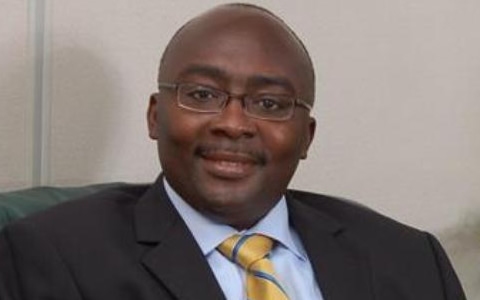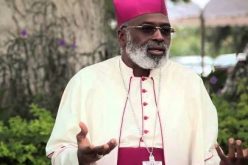 The Ghanaian Chronicle – Dr. Mahamudu Bawumia, 2008 and 2012 Vice-Presidential candidate for the New Patriotic Party, yesterday outlined the history of economic indiscipline which have continuously plunged the country into economic hardships and decline since independence, and called for multi-party and national discussions on concrete measures to check the gross economic indiscipline that Ghana suffers.
The Ghanaian Chronicle – Dr. Mahamudu Bawumia, 2008 and 2012 Vice-Presidential candidate for the New Patriotic Party, yesterday outlined the history of economic indiscipline which have continuously plunged the country into economic hardships and decline since independence, and called for multi-party and national discussions on concrete measures to check the gross economic indiscipline that Ghana suffers.
He was delivering the inaugural Alhaji Aliu Mahama lecture organized by the Alhaji Aliu Mahama foundation to mark the 1st anniversary of the passing of the former Vice -President. It was chaired by former President Kufuor.
According to the former Deputy Governor of the Bank of Ghana, developing countries have huge gaps in sectors such as roads, water, energy, education, health, agriculture and the problem governments’ face was one of insufficient financial, institutional and human capital resources to solve these problems.
“Governments, therefore, have the onerous responsibility to manage the resources of the country to meet the aspirations of its current citizens, as well as future generations.
“While it is clear that accomplishing these goals require fiscal and monetary discipline, the lesson from history is that the temptation to abandon discipline for political expediency is very high.”
Dr. Bawumia noted the cost of the persistent indiscipline on the economy since independence and said “What has been the cost of this persistent fiscal and monetary indiscipline by successive governments since independence?
We can think of this in terms of the impact on economic growth, employment, interest rates, inflation, etc. I will, however, focus on its impact on the exchange rate of the cedi over the years. ”
According to him, a development in the cedi exchange rate since independence is that it has been on a continuous one direction slide. “The only question is how fast the depreciation is for different governments! Let’s look at some numbers.
“At independence, Ghana was part of the West African Currency Board using British Pounds, shillings and pence. The exchange rate was the equivalent of 73 pesewas to the US dollar. By 1965, Dr. Kwame Nkrumah introduced the Cedi. The exchange rate at this time was ¢1.04/$.
“By 1983 the exchange rate was ¢52.6/$ and by 1992 the exchange rate was ¢520.8/$. By 2000, the exchange rate was ¢7047/$ and by 2008 the exchange rate was GH¢1.19/$ (¢11,900/$). By October 2013, the exchange rate was GH¢2.20/$ (¢22,000/$) with all indications that it could decline further by the end of the year.
“The price of fiscal and monetary indiscipline by successive governments since independence is that cumulatively, between 1965 when the cedi traded at ¢1.04/$ and October 2013 when it is trading at GH¢2.2 (¢22,000)/$, the U.S. dollar has appreciated relative to the cedi by some 2,000,000%!.
“The value of the cedi has been decimated in the process, losing 99.9999% of its value relative to the US dollar. For a small open economy like Ghana, this trend is worrying and should be worrying for all Ghanaians.
“Our economy is highly import dependent and these massive these massive depreciations in the currency end up piling more hardships on Ghanaians as the cost of living increases.”
Dr. Bawumia compared the relationship between the US Dollar and the British Pound for example, where the pound had only appreciated against the dollar by 1.5% since 1965 and called for a national discussion on enforcing fiscal and monetary discipline.
“Mr. Chairman, technically, having a stable exchange rate is not difficult to do. In the case of Ghana, no matter what exchange rate regime is adopted, there is a critical requirement by governments of a commitment to fiscal discipline beyond the electoral cycle.
“Are the politicians willing to abide by this discipline regardless of the impact on our electoral fortunes? More importantly, are the voters going to demand this discipline from politicians”?
He noted that the passage and enforcement of a Fiscal Responsibility Act will be important in this regard if it is supported by political will. “A Fiscal Responsibility law will require governments to declare and commit to a fiscal policy that can be monitored.
“It will include fiscal rules (including rules governing election year spending), provisions for transparency and sanctions (including sanctions on the Executive). It would mean for example that governments cannot by law spend above a certain limit relative to revenues.
“Fiscal indiscipline and the resulting fiscal excesses, he continued, are ultimately paid for by ordinary citizens who have no place at the decision making table of the politicians.
“It is, therefore, important that labour, civil society and all other stakeholders make a push for the passage of a fiscal responsibility law as soon as possible. In this context stakeholders can also debate whether the exchange rate regime that we are operating is optimal or whether we should move towards a currency board arrangement like Hong Kong and live with the discipline that would entail.”










